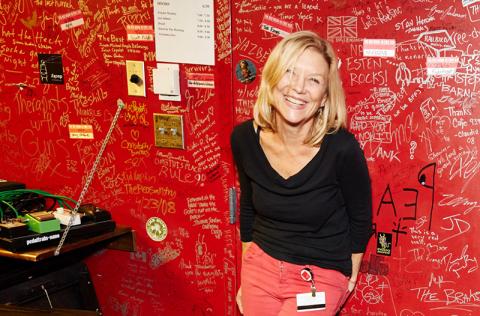Bonnie Hayes: Democratizing Songwriting

Berklee Songwriting Department chair Bonnie Hayes
Photo by Kelly Davidson
Upon becoming Berklee’s Songwriting Department chair last year, Bonnie Hayes set her sights on creating “the world’s foremost songwriting curriculum.” There was little doubt that the effervescent Hayes was just the woman for the job, as evidenced by her outstanding work with artists such as Bonnie Raitt, Natalie Cole, Booker T. & the M.G.’s, Adam Ant, and Robert Cray, among many others, in addition to her own gripping music.
Since taking over, Hayes has focused on multiplying the number of forums for Berklee songwriters, including open mic nights, songwriters’ circles, and band showcases. Hayes recently spoke about songwriting at Berklee and beyond; the following is an edited and abridged version of that conversation.
On her vision for Songwriting at Berklee:
“As I started working with more and more students, I realized that to say, ‘There is such a thing as a good song and we’re going to teach you how to write one,’ assumes that there is such a thing as a bad song. My response is to say, ‘Let’s broaden who we’re talking to in this department. Let’s make sure that everybody gets a chance to be heard and gets the tools that they need to build the kind of songs that they want to build without getting shut down by judgment or by a story about what is or isn’t a real or acceptable song.
That includes looking at things like gender and the way that it works at Berklee and in the culture at large—what tends to happen with women that doesn’t happen to or with men as much—or ethnic, racial, and international biases. Let’s not say, ‘If you’re writing in Spanish, who’s going to listen?’ Let’s not put those songs ‘over there’ and marginalize you if you’re doing that or if you’re writing in Chinese, or for a K-pop audience, or even if you’re writing songs that have two chords.”
On songwriting tenets, and breaking them:
“Write a song that has a point because it’s really good if you know what you’re writing about; otherwise, no one else will know what you’re writing about. It’s important to say, ‘Look, 99 percent of the songs that you’re going to notice are going to adhere to eight or more of these 12 basic tenets, but you decide. It’s your call. You don’t have to do anything, but here they are.’ And then you can sculpt it to Nashville or indie rock or pop; you can learn what the accepted things are in each of those genres, and then ‘use’ or ‘not use.’
I don’t want to show those things as rules. They’re conventions. They’re what’s happening, but it doesn’t mean that they are what has to be. We can find an exception to every single supposed tenet. Our saying in the department is ‘tools, not rules.’”
On her own songwriting:
“I probably have a little bit of the same thing that happens to the students who come here in terms of being hypercritical. I was out of the self-mutilation stage of songwriting for a long time—but [laughs] I’m back! Nothing feels super authentic to me right now, and I think it’s partly because I don’t have a lot of upheaval or emotional drama going on in my life.”
On making a living as a songwriter in a period of flux for music distribution:
“There’s going to be an enormous comeuppance in the number of people paying for streaming. It’s going to happen. Streaming hasn’t even hit China and India, so you have enormous sleeping markets out there. Copyright is protected for watching movies, but who buys movies? I don’t; I stream them or I rent them. That’s the model, and that model is going to work. It’s just going to take a while to get into place while we wait for the giants that own most of those streaming royalties and don’t want to let go of them to get their fingers peeled, one by one, off of them…my hope is that once that kicks in, it’s going to create an enormous amount of revenue for songwriters that will replace mechanical sales royalties.
But here’s the thing: it’s always been like that. It’s always been hard to get paid. I would wait two years for foreign statistics while everybody in the world collects money before I get my little piddling share. That has been the reality. Nobody ever made the money they were supposed to make. That’s the gig. But, you’re doing something real. There are people working in cubbies for 50 years. Take it. I don’t have a lot of sympathy for the whining. I just feel like it was ever thus.”
On paths in songwriting:
“Songwriting is not something that’s only meant for a very special few. Songwriting is something that people do in all different ways. They do it for expression only, as a hobby, as a side thing when they’re doing publishing during the day. There are people who write as an adjunct to their performance careers. There are people who write only for other performers. There are people who write only in teams. There are people who write only in tracks. There are artist writers. So, there are a million ways to do this.”